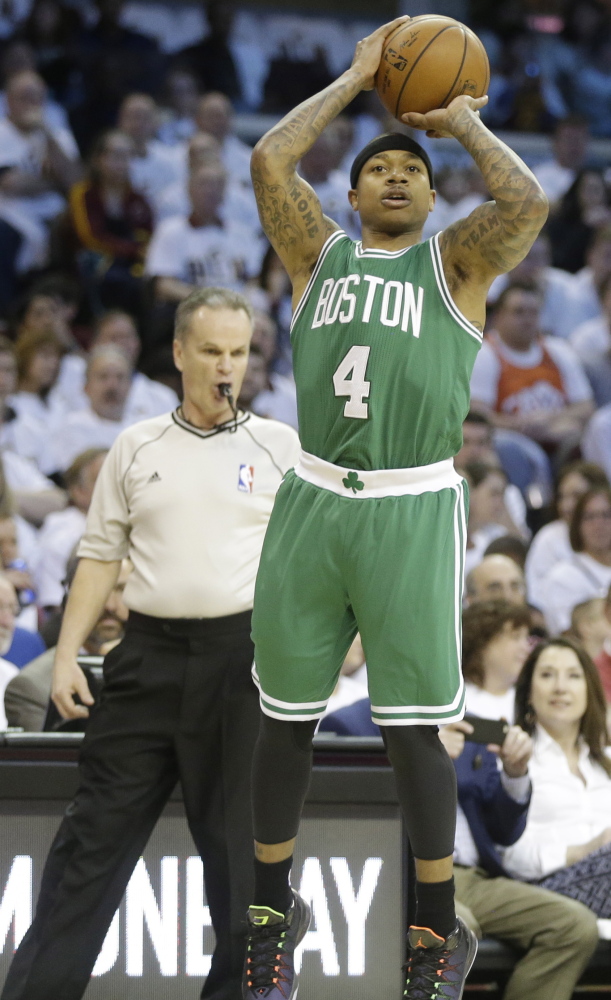BOSTON — The reconstruction of the Boston Celtics is ahead of schedule. Being swept in the first round can’t brush away that reality.
The Celtics were a long shot to even reach the playoffs in a season with numerous personnel changes. Once they got there, they weren’t expected to be as competitive as they were against the mighty Cleveland Cavaliers.
But they got to the postseason and battled the Cavs to the very end of Game 4. And they are in good shape to keep progressing with a wealth of draft picks, plenty of space under the salary cap and a young coach who has drawn raves in his two seasons.
“I highly respect their coaching staff,” Cavs star LeBron James said after Sunday’s 101-93 win finished the series, “and especially their head coach.”
Of the players on the Celtics’ roster in Brad Stevens’ first game as coach in 2013 after leading Butler to NCAA title games in 2010 and 2011, only six remained in Sunday’s loss. And no one in that elimination game likely would start for the Cavaliers.
But after trading point guard Rajon Rondo on Dec. 18 and leading scorer Jeff Green less than a month later, then acquiring Isaiah Thomas and Jae Crowder, the Celtics had a core that played hard and was more accepting of the rebuilding process.
They were 20-31 before the All-Star break, and then 20-11 afterward, second only to Cleveland in the East. Their 40-42 record was a 15-win improvement over last season.
“The best thing that I take from this year is that there’s growth, there’s building, there’s progress. Now we have to build on it,” Stevens said. “That’s the hard part is now continuing it and build on it. But we’ve got a good environment. That’s a real positive moving forward.”
Danny Ainge, president of basketball operations, has collected draft picks the way the Celtics once hoarded championship banners. They have 17 of those hanging above their court – the last in 2008 with Paul Pierce, Kevin Garnett and Ray Allen – but are far away from another.
With four of the top 45 draft picks this year and the potential of four first-round choices next year, he has a chance to speed up that process.
Stevens’ reputation and coaching skills on an improving team might even lure some talented free agents.
“I’m not a big salesman, never have been, not been very good at it,” Stevens said. “The only thing I can ever say is, ‘You want to be part of a great environment. It’s a good environment.’ ”
The acquisition of Thomas from Phoenix two months after the departure of Rondo gave the Celtics a point guard who was a better shooter and moved the ball around more quickly.
Crowder arrived in the Rondo deal with Dallas, where he played sparingly, and emerged as an energetic, physical defender whose spirit rubbed off on teammates.
But the Celtics need more – a rim-protecting big man, a go-to shooter and a star to buy into the team’s development process.
“We’re proud but we’re not satisfied,” Thomas said after the sweep. “This team has a lot of potential.”
It might have more if it had missed the playoffs and qualified for the draft lottery.
Yet the experience of competing with one of the NBA’s best teams in the postseason has advantages.
“In the playoffs, everything slows down a little bit more and it shows that a few turnovers, a few bad shots, that could be the reason why you lose the game,” guard Avery Bradley said.
Thomas, Bradley and 2014 first-round pick Marcus Smart form a young, improving backcourt. Center Tyler Zeller exceeded expectations but, like 2013 first-rounder Kelly Olynyk, lacks the bulk to pound the boards.
Forwards Jared Sullinger and Brandon Bass and swingman Evan Turner need to be more consistent.
Send questions/comments to the editors.


